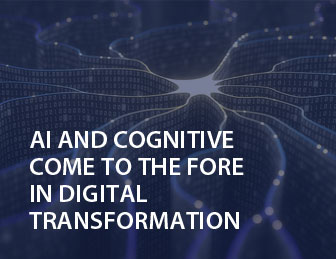 Artificial intelligence is a way of making a computer, robot or software think intelligently, just like humans. It is accomplished by studying how human brain thinks, learns and works while solving problems. The outcomes are then used to develop intelligent software and systems. AI combines multiple disciplines such as computer science, psychology, biology, linguistics, mathematics and engineering. A major thrust area of AI is the development of computer functions associated with human intelligence, such as learning, problem solving and reasoning.
Artificial intelligence is a way of making a computer, robot or software think intelligently, just like humans. It is accomplished by studying how human brain thinks, learns and works while solving problems. The outcomes are then used to develop intelligent software and systems. AI combines multiple disciplines such as computer science, psychology, biology, linguistics, mathematics and engineering. A major thrust area of AI is the development of computer functions associated with human intelligence, such as learning, problem solving and reasoning.
A computer program without AI can answer the specific questions it is meant to solve, while a program with AI can answer the generic questions it is meant to solve. AI programs can absorb new modifications by putting highly independent pieces of information together without affecting the structure. Google Maps use AI to analyze the speed of movement of traffic at any given time. AI has been used to create the systems that learn what types of banking transactions are fraudulent. Echo smart speakers allow you to integrate Alexa, an AI powered personal assistant into your living room and use voice commands to ask natural language questions, order pizza, play music, hail an Uber and integrate with smart home devices.
In the real world, knowledge has some unwelcomed properties such as its volume is huge and next to unimaginable. It is also not well organized, well formatted and keeps changing continuously.
AI technique is used to organize and use knowledge efficiently such that:
- It is perceivable by the people who provide it.
- It is easily modifiable to correct errors
- It is useful in many situations, even though the data is complete or inaccurate.
Alexa (Amazon), Google Assistant (Google), Siri (Apple) and Cortana (Microsoft) are some of the highly popular virtual AI assistants that have proved to be highly useful for the multitasking professionals out there. You can ask these assistants questions like “What’s on my schedule today”, “Where is the nearest Chinese restaurant”, etc., and the assistant will respond by finding the information from your smart phone, or sending commands to other apps.
The goals of AI include:
- Creation of expert systems that exhibit intelligent behavior, learn, demonstrate, explain and advice to the user.
- Implementing human intelligence in machines by creating the systems that learn, think, understand and behave like humans.
Artificial intelligence is the simulation of human intelligence processes by machines, especially computer systems. These processes include:
- Learning (Acquisition of information and rules for using the information)
- Reasoning (Making use of the rules to arrive at the approximate or definite conclusion), and
- Self-correction.
AI has gained prominence recently due to the big data that the businesses are collecting. AI can be used to identify patterns in the data more efficiently than humans, enabling the enterprises to extract more useful insights than the humans.
Examples of AI technology include the below ones:
- Machine learning
- Robotic process automation
- Machine vision
- Natural language processing
- Robotics
AI applications
The technology is being used in healthcare to improve patient outcomes, reduce costs and making better diagnosis than humans. One of the best known use cases of AI in healthcare is IBM Watson. The AI enabled system understands natural language and responds to the questions. It mines patient data to form a hypothesis, and presents the same with a confidence scoring schema.
Chatbots for intelligent automated responses
Other AI applications use include chatbots. These are computer programs that are used to answer the questions online and help the customers in scheduling appointments and offering virtual assistance. Chatbots are incorporated into the websites to provide immediate service to the customers. Integrating the machine learning algorithms into analytics and CRM allows the businesses to uncover information on serving the customers in better ways.
Expert systems and computer assistants
In education sector, AI can adapt to the needs of the students, helping them stay on the track and work at their own pace. IBM Watson has been effectively used in the real estate industry in the process of buying and selling homes and properties. Personal finance applications such as Turbo Tax collect personal data and provide financial advice to the investors. Many businesses especially startups are building question and answer computer assistants that are programmed to answer questions by examining the ontology and taxonomy of a database. Expert systems integrate machine, software and special information to impart reasoning and providing automated responses and advice to the users based on API integration.
Robotics is also a major field related to artificial intelligence. Robots require intelligence to handle tasks such as object manipulation and navigation, localization, motion planning and mapping.
Though AI can virtually be used in any industry, some specific use cases of AI include the below ones:
- Gaming
- Speech recognition
- Natural language processing
- Vision systems
- Intelligent robots
- Handwriting recognition
Artificial intelligence emphasizes on the creation of intelligent machines that work and react like humans. AI can be used to program the computer for certain tasks such as:
- Knowledge
- Learning
- Reasoning
- Problem solving
- Perception
- Planning
- Ability to manipulate and move objects
Knowledge engineering is a core part of AI research. Machines can be made to react like humans if they are provided enough information about the world. Artificial intelligence must have access to objects, properties, categories and relations between all of them to implement knowledge engineering.
Future research in artificial general intelligence
Artificial intelligence today is known as narrow or weak AI as it is designed to perform narrow tasks, like facial recognition or playing chess. The long-term goal of the researchers is to create a strong or Artificial General Intelligence (AGI) that would outperform humans in nearly every cognitive task.
From Siri to self-driving cars and Google search engine algorithms to autonomous weapons, AI is progressing rapidly.
At Flexsin, we create powerful Artificial intelligence solutions that are capable of enhancing operational efficiency and fuelling business growth. Our experts help the businesses in gaining next-gen capabilities imperative for success in a digital-first world. Do you have lots of data but don’t know how to create value out of it. Contact Flexsin, and we will develop and implement an AI strategy that will help drive your operational efficiency and ROI.


 Prashant
Prashant

